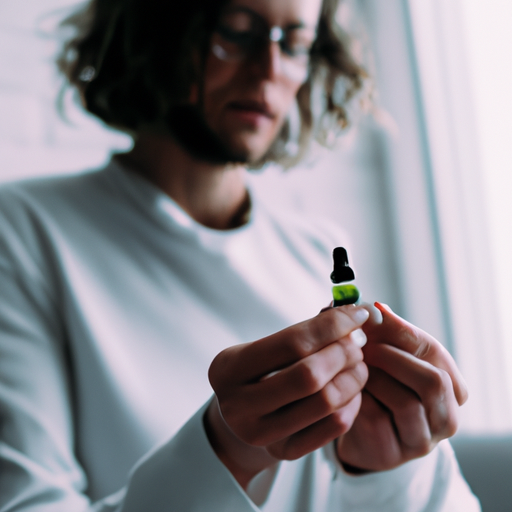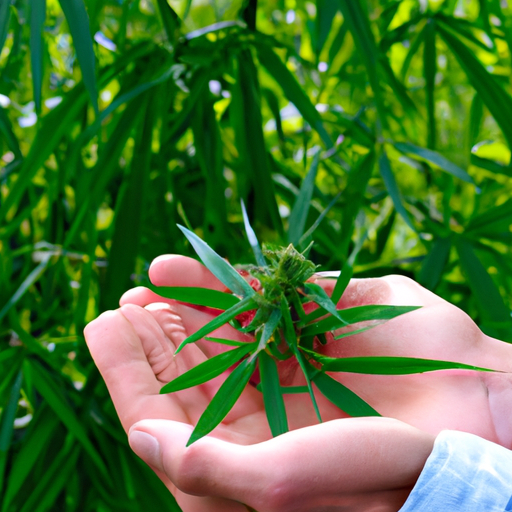No products in the cart.
No products in the cart.
Ladies and gentlemen, let’s talk about something that affects millions of people around the world: anxiety. It’s that unwelcome companion that creeps into our minds, stirring up worry and stress. Now, imagine a potential solution that offers a glimmer of hope, a natural remedy that may help ease the relentless grip of anxiety. Enter CBD, the intriguing compound derived from the cannabis plant that has been making waves in recent years. Today, we will explore just how effective CBD is for managing anxiety, shedding light on this increasingly popular topic.
In this article, we will delve into the world of CBD and anxiety, guiding you through the scientific research and real-life experiences that have shaped the conversation. From exploring the potential therapeutic benefits of CBD to understanding its mechanisms of action, we will delve into the evidence that supports its use as an anxiety management tool. By the end, you will have a comprehensive understanding of CBD’s potential role in combating anxiety, empowering you to make informed decisions about your own well-being. So, let’s set sail on this voyage of discovery and find out just how effective CBD can be for managing anxiety. CBD, or cannabidiol, is a natural compound found in cannabis plants. It is one of the many cannabinoids present in the plant, but unlike THC, CBD does not have any psychoactive effects. Instead, CBD is known for its potential therapeutic properties, particularly in managing anxiety. In this article, we will explore the relationship between CBD and anxiety, the benefits of using CBD for anxiety management, dosage guidelines, potential side effects, the variation in CBD products, legal considerations, personal experiences, and professional recommendations.

CBD, as mentioned earlier, is a cannabinoid found in cannabis plants. It can be derived from either marijuana or hemp. Marijuana-derived CBD contains higher levels of THC, the psychoactive compound that produces a “high” sensation. On the other hand, hemp-derived CBD contains less than 0.3% THC, making it non-intoxicating.
Anxiety is a common mental health condition that affects millions of people worldwide. It is characterized by feelings of excessive worry, fear, and unease. Anxiety disorders can range from generalized anxiety disorder (GAD) to social anxiety disorder, panic disorder, and post-traumatic stress disorder (PTSD). Those who suffer from anxiety often experience physical symptoms such as increased heart rate, rapid breathing, and difficulty concentrating.
While the exact mechanisms are still being studied, researchers believe that CBD interacts with the endocannabinoid system (ECS) in the body. The ECS is responsible for maintaining balance in various bodily functions, including mood, sleep, appetite, and stress response. CBD is thought to modulate the ECS by influencing receptors and enzymes, leading to potential anxiolytic (anti-anxiety) effects.
Studies have indicated that CBD may activate serotonin receptors, which play a crucial role in regulating mood and anxiety. By increasing serotonin levels in the brain, CBD may help alleviate anxiety symptoms. Additionally, CBD has been found to interact with other receptors, such as the vanilloid receptor, which may contribute to its potential anti-anxiety effects.
While further research is needed, preliminary studies suggest that CBD may have promising benefits in managing anxiety. A 2010 study published in the Journal of Psychopharmacology found that CBD reduced anxiety symptoms in individuals with social anxiety disorder during a simulated public speaking task. Another study published in the same journal in 2019 showed that CBD improved sleep and reduced anxiety in a group of individuals with insomnia.
Furthermore, a review of numerous studies published in the Journal of Clinical Psychology in 2019 concluded that CBD showed promise in reducing anxiety symptoms in various anxiety disorders, including GAD, PTSD, and social anxiety disorder. However, it is important to note that more high-quality research is needed to establish CBD’s efficacy and safety for managing anxiety.

CBD is believed to offer several potential benefits for individuals with anxiety disorders. These include alleviation of anxiety symptoms, reduction of stress and fear, and improvement in sleep patterns.
Many individuals experience relief from symptoms such as excessive worry, restlessness, and irritability when using CBD. By interacting with serotonin receptors in the brain, CBD may help regulate mood and reduce anxiety levels. This can contribute to an overall sense of calm and wellbeing.
CBD has shown promise in reducing stress and fear responses in various studies. It may help individuals cope with stressful situations by promoting relaxation and reducing the physiological symptoms of anxiety, such as increased heart rate. By modulating the body’s stress response, CBD could potentially improve overall stress management.
Sleep disturbances are common among individuals with anxiety disorders. CBD has been studied for its potential to improve sleep quality and address insomnia symptoms. By promoting relaxation and reducing anxiety levels, CBD may help individuals achieve better sleep patterns, leading to improved overall wellbeing.
Finding the right CBD dosage for anxiety can be a personal and individualized process. Factors such as body weight, severity of anxiety symptoms, and individual tolerance can influence the optimal dosage. As CBD affects everyone differently, it is recommended to start with a low dosage and gradually increase until the desired effects are achieved.
When it comes to CBD administration, there are several methods to choose from. These include:
CBD is generally well-tolerated by most individuals, but like any compound, it can have potential side effects. These side effects are typically minor and may include dry mouth, dizziness, drowsiness, and changes in appetite. It is important to note that these side effects are not experienced by everyone and tend to be temporary.
Another consideration is the potential interaction between CBD and certain medications. CBD can inhibit the activity of certain liver enzymes responsible for metabolizing medications, which may lead to increased blood levels of those medications. It is crucial to consult with a healthcare professional before using CBD, especially if you are taking any prescription medications.
Additionally, the quality and safety of CBD products can vary. It is essential to choose reputable brands that undergo third-party testing to ensure that their products are free from contaminants and accurately labeled. Quality and safety concerns can be minimized by purchasing CBD products from reliable sources.
When shopping for CBD products, you may come across terms such as full-spectrum CBD and CBD isolate. Understanding these variations can help you make an informed decision regarding which type of CBD product is right for you.
Full-spectrum CBD products contain all the beneficial compounds naturally present in the cannabis plant, including other cannabinoids, terpenes, and trace amounts of THC. This combination of compounds is believed to produce an “entourage effect,” enhancing the potential therapeutic benefits of CBD. CBD isolate, on the other hand, undergoes additional processing to remove all other compounds, leaving behind pure CBD.
CBD products come in various forms, allowing individuals to choose the most suitable method of consumption. These include oils, capsules, edibles, topicals, and vaping products. Each form has its own advantages, such as convenience, discreteness, or targeted relief. Finding a product that aligns with your preferences and needs can enhance your CBD experience.
To ensure the safety and efficacy of CBD products, it is essential to choose high-quality options. Look for CBD products that are third-party tested, as this indicates that independent laboratories have verified the product’s contents and purity. Additionally, consider the source of the CBD and the extraction method used, as these factors can impact the overall quality.
The legal status of CBD can vary depending on where you live. In the United States, CBD derived from hemp with less than 0.3% THC content was federally legalized with the passage of the 2018 Farm Bill. However, individual states may have their own regulations and restrictions regarding CBD. It is important to be aware of the laws in your area and ensure that you are purchasing and using CBD products in compliance with local regulations.
Many individuals have reported positive experiences with using CBD for anxiety management. Anecdotal evidence suggests that CBD has helped reduce anxiety symptoms, improve mood, and promote relaxation. However, it is important to approach personal experiences with caution, as they are subjective and may not be a reliable indicator of CBD’s effectiveness for everyone. Individual results can vary, and it is always recommended to consult with a healthcare professional before starting any new treatment.
When considering CBD for anxiety management, it is crucial to consult with a healthcare professional. They can provide personalized advice based on your medical history, current medications, and individual needs. A healthcare professional can help determine an appropriate dosage, monitor any potential interactions, and guide you throughout the treatment process. Self-diagnosis and treatment should be avoided, as it is important to have professional guidance when dealing with anxiety or any other medical condition.
In conclusion, CBD shows promise as a potential option for managing anxiety. While research is still ongoing, preliminary studies and anecdotal evidence suggest that CBD may provide relief from anxiety symptoms, reduce stress and fear, and improve sleep patterns. Finding the right dosage and method of administration is important, and it is always recommended to consult with a healthcare professional. When choosing CBD products, prioritize quality and safety by selecting reputable brands that undergo third-party testing. Understanding legal considerations and potential risks can ensure a safe and effective CBD experience. CBD should be viewed as a complementary approach to anxiety management, and professional guidance is essential for optimal results.